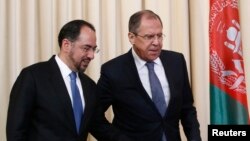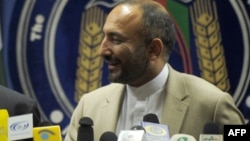Russia has hinted at involving the United States in a newly-launched regional dialogue Moscow says is aimed at seeking a negotiated settlement to the conflict in Afghanistan. The move comes as Afghanistan’s national security adviser is due to visit Moscow to discuss the prospects for promoting reconciliation with armed opposition in his country.
Moscow’s stepped up Afghan diplomacy stems from its concerns that a protracted conflict is encouraging Islamic State militants to establish a foothold in the war-torn country and export terrorism to neighboring Central Asian states that ultimately could threaten Russian security.
In December, the Russian government hosted senior foreign ministry officials from China and Pakistan for the first time to discuss ways to encourage direct talks between the Afghan government and the Taliban. The participants also exchanged views on how to collectively work to contain “spillover” effects of terrorism.
Kabul strongly objected being left out of the trilateral meeting, however, while U.S. officials also questioned Russia’s intentions for organizing the talks.
The criticism and skepticism prompted Moscow to expand the format of the dialogue to include Afghanistan, along with Iran and India, in the next meeting it hosted last month.
Involving more partners
“At its next stage we think it will be important to, in a timely fashion, involve in that same process our Central Asian partners as well as the United States,” said Vladimir Safronkov, the Russian deputy ambassador to the United Nations, on Friday. He was addressing a U.N. Security Council meeting on the situation in Afghanistan.
Safronkov reiterated that the consultations are working out “a single regional approach” to “reinvigorate” the Afghan reconciliation process.
He made the remarks on a day when the Russian Foreign Ministry announced that Afghan National Security Adviser Haneef Atmar will visit Moscow March 17 for talks with Foreign Minister Sergei Lavrov.
“The officials will discuss the security situation and prospects for promoting national reconciliation in Afghanistan, as well as ways to develop multilateral cooperation within the Moscow format of regional consultations on Afghanistan,” the ministry said.
Russia-Taliban contacts not welcome
While Afghan officials and the U.S. military welcome Russian peace efforts, they are critical of Moscow’s overt contacts with the Taliban.
Russia maintains that “the limited contacts” with the Taliban are meant to encourage the group to join Kabul-led peace efforts and to ensure security of Russian citizens in the country.
But General John Nicholson, U.S. commander of foreign forces in Afghanistan, told a congressional hearing last month that Russian attempts to overtly legitimize the Taliban are based on arguments that the insurgents, and not Afghan forces, are effectively fighting IS militants. He dismissed those assertions as misleading and said Moscow is only trying to undermine U.S.-led counterterrorism efforts in the region.
Speaking in India earlier this week, National Security Adviser Atmar said his government continues to warn Moscow that any assistance to the Taliban will not be seen as “a gesture of friendship" toward Afghanistan.
“They [Russia] are assuring us that this is not the case. All they want to do is to facilitate peace in Afghanistan and second a counter-response to Daesh. There we disagree. We say the best response to Daesh is state-to-state relations and cooperation, you cannot get it from non-state actors. Don’t expect a terrorist to be taking on another terrorist,” explained Atmar, using the Arabic acronym for IS.
Afghan officials in the country’s northern border provinces have also lately alleged that Russia is helping the Taliban establish training camps in their areas.
Russia says allegations ‘absurd’
The Russian Foreign Ministry on Friday responded to what it dismissed as baseless allegations and U.S. criticism.
"The distribution of such absurd inventions revealed a staged campaign to discredit our country, during which the Afghan and world community is thrown the thesis of Russia 'undermining' international anti-terrorist efforts in Afghanistan,” according to a statement published on the ministry’s website.
It went on to assert that the campaign is to “divert attention from accountability for the numerous mistakes in more than 16 years of foreign military presence in Afghanistan.”
Moscow blames the U.S.-led international efforts for the worsening Afghan security conditions that it says allowed IS to find space in the country.
Afghan security forces backed by American airpower have conducted successful major operations against IS over the last year and confined the terrorist group to less than three districts in the eastern Nangarhar province, according to a latest U.S. military assessment. It says the number of IS fighters also has been reduced to about 700 from an estimated 3,000 a year ago.
Speaking on Friday at the U.N. Security Council meeting, though, Russia’s Safronkov challenged those assessments.
“We think that there are some three-and-a-half-thousand active members of [Islamic State] operating in the country. The realistic figure given all the cells operating could be much higher,” he said. The Russian ambassador contradicted U.S. assessments and asserted that IS is active in more than one Afghan province.
“Their main regions of action are Helmand, Kandahar, Faryab, Bagram, Kunduz. So we would call everyone to devote to that problem heightened attention and not to try and somehow gloss it over to ignore it,” Safronkov said..
IS has stepped up attacks in Afghanistan and took credit for Wednesday's suicide attack on the country's largest military hospital in Kabul. The assault left more than 50 people dead and scores of others wounded.
Russian envoy Safronkov asserted that the Kabul attack is more proof of the expanding and strengthening structure of IS in Afghanistan.







